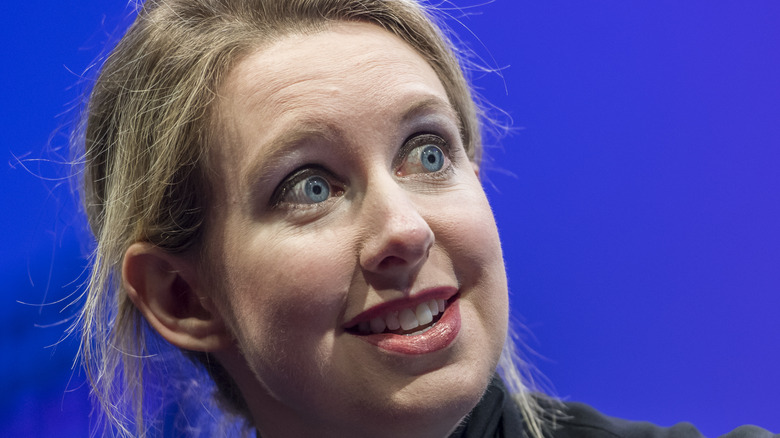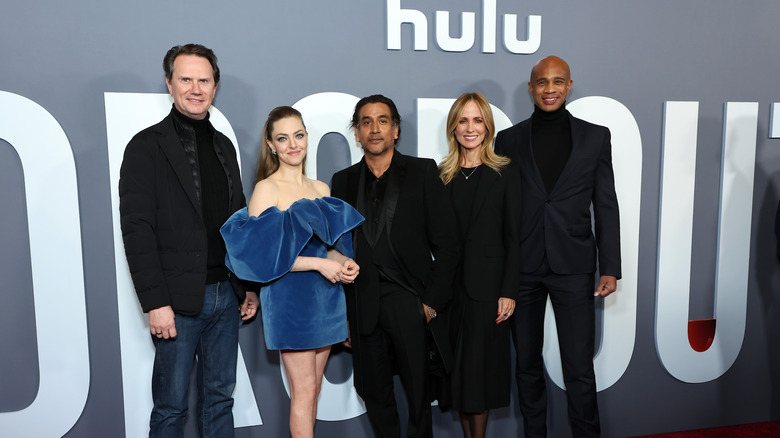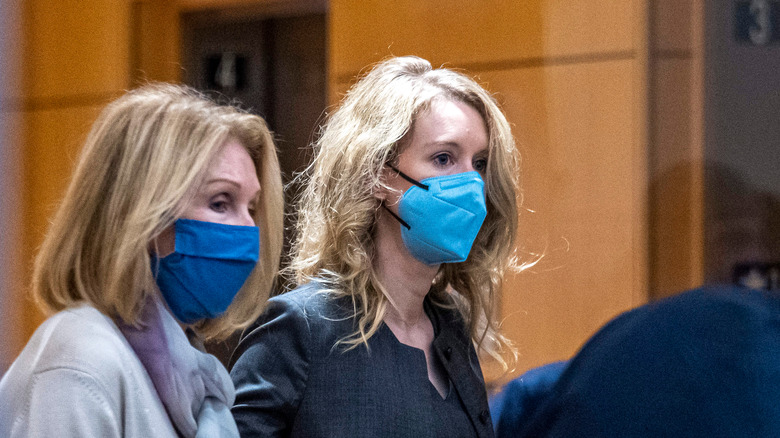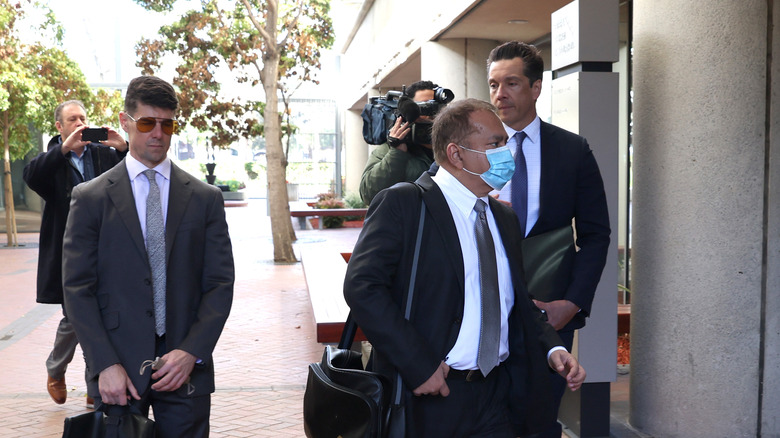Things The Dropout Left Out From The Elizabeth Holmes Case
Millions of people have been following the journey of Elizabeth Holmes, the former Silicon Valley CEO who claimed her company could revolutionize the healthcare industry. While those claims of the efficacy of her nanotechnology were later largely proven false, Holmes' meteoric rise to fame and, later, fall into disgrace has captivated audiences for years now. The story has spawned several podcasts, books, television specials, and an upcoming movie. A new limited-run drama on Hulu called "The Dropout" aims to take a story we've all heard by now and tell it a different way — from Holmes' perspective.
The series uses a lot of information gathered by reporters at ABC for their podcast by the same name, according to the Los Angeles Times, but those involved with the show said they had to take some creative liberties to tell an emotional story. So how much of the series' story is based on facts, and what did they choose to leave out?
What motivated Elizabeth Holmes?
One of the biggest mysteries about Elizabeth Holmes is what motivated her. People inside her own company alerted the higher-ups to the issues with their technology plenty of times, according to The New York Times, but Holmes pressed on. She continued to tell investors and potential business partners that her device – which was supposed to be able to run hundreds of tests on just a single drop of blood – was revolutionary and the technology was coming along.
Actress Amanda Seyfried, who plays Holmes in the adaptation, told Harpers Bazaar that her portrayal is "all based on facts and information," even if it's impossible to know exactly what Holmes was thinking. Siegfried told The New York Times that the key, for her, was that Holmes truly believed that her idea could become a reality.
"Our imaginations are wild if we exercise them. I chose to just, as this character, believe in everything," Seyfried said. "And when I was told that something wasn't true, I doubled down."
The story was ongoing
Even as production and filming was underway for "The Dropout," Elizabeth Holmes' story wasn't over. Holmes was on trial until early this year for accusations of defrauding investors, and new information was coming out every day. Showrunner Liz Meriwether told the Los Angeles Times that those continuous updates often made it difficult to make progress on the show because they needed to reassess what should be included and what needed to be left out.
"It was just so hard to kind of be at a certain point like, 'We just can't. We just don't have time' or 'We've already shot that,'" Meriwether said.
One particular issue that came up was Holmes' relationship with her now ex-boyfriend Sunny Balwani. Texts between the two were unveiled during the trial, Meriwether told the Los Angeles Times, and she struggled to include specific moments that struck her, like a conversation the two had about raising a baby bird together.
"I was like, 'What if there's a baby bird puppet?!' And [the props master], very rightly, was like, 'Let's not do baby bird puppets,'" Meriwether said. "And I think it's better for everybody."
Sunny Balwani and Elizabeth Holmes' relationship
Elizabeth Holmes and Sunny Balwani weren't just romantically involved. Balwani worked with Holmes at Theranos, and he's facing his own trial for the part he played in the company (via The New York Times). The public's understanding of their relationship changed significantly in the lead-up to Holmes' trial.
While their relationship was kept under wraps for much of their time working together, Holmes later claimed during legal proceedings that Balwani had been abusive and controlling (via Tech Crunch). But not much of this dynamic makes its way into "The Dropout," according to Tech Crunch. Because more and more of Holmes and Balwani's relationship was revealed when the show was already filming, it was difficult for Liz Meriwether and others working on the show to get those perspectives in (via the New York Times).
"After years of trying to imagine what those conversations were, we got dumped with all of the actual conversations in the middle of filming," Meriwether told the Times.
The employees who worked with Holmes
"The Dropout" doesn't just look at Elizabeth Holmes and Sunny Balwani. The fictionalized series also tries to tell the stories of the people who worked beneath her at Theranos and saw the events unfolding in real-time. Some of these stories are based in fact and even use the same names, according to Parade, such as the scientist Ian Gibbons.
Gibbons alerted Holmes and others at the company of issues with the technology they were trying to build, according to Parade, and was later let go. He committed suicide as a result of the situation he was put in through participating in Theranos' work, Parade reports, and the story in "The Dropout" sticks close to the real-life facts.
But not every character is so directly connected to reality. Brendan Morris, for example, is a fictional character (via Parade). His storyline may be based on real events, but it's not the exact same as any specific employee, according to Parade.
Why make the show?
Because Elizabeth Holmes' story is so widespread, "The Dropout" might seem like an unnecessary addition. Between books, news articles, podcasts, and numerous other attempts to capture her story, there's not really any shortage. But as showrunner Liz Meriwether told the Los Angeles Times, the show is working to capture Holmes' motivations and her side of the story to explain how it happened.
"Even writing the scenes of the things that I knew had happened, it was a challenge figuring out what was going on in [Holmes'] head," Meriwether told The New York Times. "That ultimately makes the series more interesting, because there are just things about her that don't make sense."
Right now, shows like that are pretty popular and doing well with the public. According to Tech Crunch, a similar show on Netflix called "Inventing Anna" — which follows socialite and fake heiress Anna Delvey as she cons wealthy elites – got more views in a one-week period than any other English-language show in the same amount of time. Even if they've heard the story before, viewers are more than willing to tune in to see a new perspective, which is exactly what "The Dropout" is trying to deliver.





